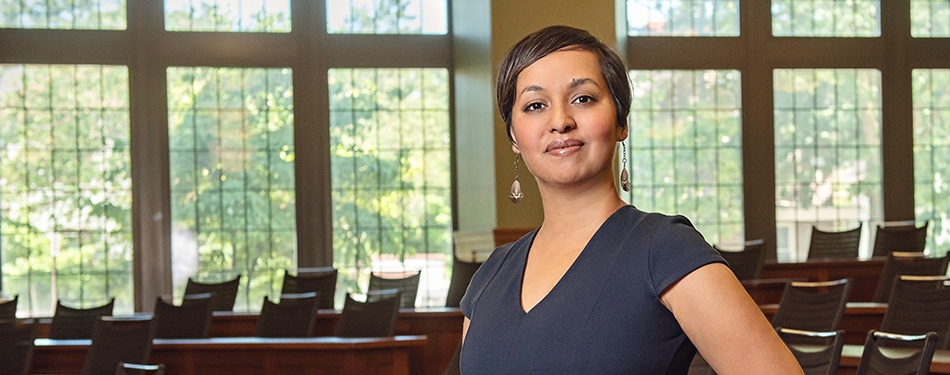Sanjukta Paul brings expertise on antitrust and labor to the Michigan Law faculty.
United States antitrust law was meant to check concentrations of economic power while also promoting fair competition.
At least, that’s the view of a growing group of scholars, advocates, and policymakers. Based on a series of congressional actions that date back to 1890, originally targeting big business and responding to a farmer-labor political coalition, antitrust law regulates various business combinations and practices.
What antitrust law was not meant to do is prevent workers from organizing.
What I bumped into as a practicing lawyer is that antitrust is potentially a threat for workers—and that, in turn, raises deeper questions about what its purposes are. We are in a moment where we're collectively having a rethink about that.
But the fact that it has been applied that way, both historically and in our own times, opens up basic questions about antitrust’s own purposes. It also causes us to think about labor markets and the legal organization of markets more broadly, said Sanjukta Paul, who joins the Michigan Law faculty this summer as a professor specializing in antitrust and labor law.
“It’s counterintuitive, and it’s not what legislators intended,” Paul said. “But what I bumped into as a practicing lawyer is that antitrust is potentially a threat for workers—and that, in turn, raises deeper questions about what its purposes are. We are in a moment where we’re collectively having a rethink about that.”
Trying to understand antitrust liability for immigrant dockworkers
Paul’s journey to Michigan Law began in 2011.
After working as an employment and civil rights litigator in Los Angeles, she signed on to help a local nonprofit, the Los Angeles Alliance for a New Economy, with legal strategy for a campaign to improve wages and working conditions for truck drivers in the ports of Los Angeles and Long Beach.
The drivers, most of them immigrants from Latin America, were independent contractors working under exploitative conditions rooted in the deregulation of their industry in the 1970s and 19880s.
Port truck drivers were not unionized, but there had been a series of so-called wildcat strikes—spontaneous work stoppages to protest conditions—that prompted private antitrust lawsuits.
Some of the worker leaders were investigated by the Federal Trade Commission—the agency established in 1914 to enforce antitrust law—on the grounds that, because they were considered independent businesses, their efforts represented collusion at the expense of their customers. Those customers of trucking services ultimately included massive corporations such as Walmart and Amazon.
“I needed to understand how it was that there could be antitrust liability for working class immigrants trying to make a living wage,” Paul said.
Paul began investigating that question in earnest in 2013, as a David J. Epstein Fellow at the UCLA School of Law, where she also taught the Workers Rights Litigation Clinic and continued to do pro bono work in concert with the ports campaign.
Her resulting paper on the topic won a prize from the Jerry S. Cohen Memorial Fund Award for antitrust scholarship.
She continued her academic work on labor and antitrust as an assistant professor of law at Wayne State University beginning in 2017.
That opened into an exploration of antitrust law’s broader role in “allocating economic coordination rights,” reframing labor coordination as one legally conditioned economic coordination mechanism among others, notably including the business firm itself.
In 2019, Paul testified as an expert before the U.S. House of Representatives Subcommittee on Antitrust, Commercial, and Administrative Law on competition in labor markets.
Expanding research on the center stage of legal and policy debates
Paul plans to continue to pursue what has proven a rich vein of scholarship once she arrives in Ann Arbor.
“It’s a huge privilege to come to Michigan,” she said. “I’m excited to work with this brilliant student body and law faculty, and in this amazing library. And there are certain intellectual traditions that are special to Michigan as a larger institution. There’s great strength in economic sociology, an older tradition of Great Lakes institutionalist economics, as well as a culture of interdisciplinary collaboration at the university—all of which is a perfect fit for my future research and teaching goals. The opportunity to be a part of all that very much went into my decision to come to Michigan.”
Paul’s book, Solidarity in the Shadow of Antitrust: Labor and the Legal Idea of Competition, reinterprets the origins and development of antitrust law in relation to labor and workers, and will be published by Cambridge University Press in 2023.
“Since I began working on this book, the labor-antitrust intersection has drifted steadily from the sidelines toward the center stages of legal and policy debates,” Paul said. “For one thing, the increasing focus both to labor as a social formation and to economic inequality and power directly implicate these areas of law and their relationship to one another. Beyond this, the ‘fissured workplace’ brings this intersection to the fore as a matter of concrete legal and policy decision-making.”
—Amy Crawford

